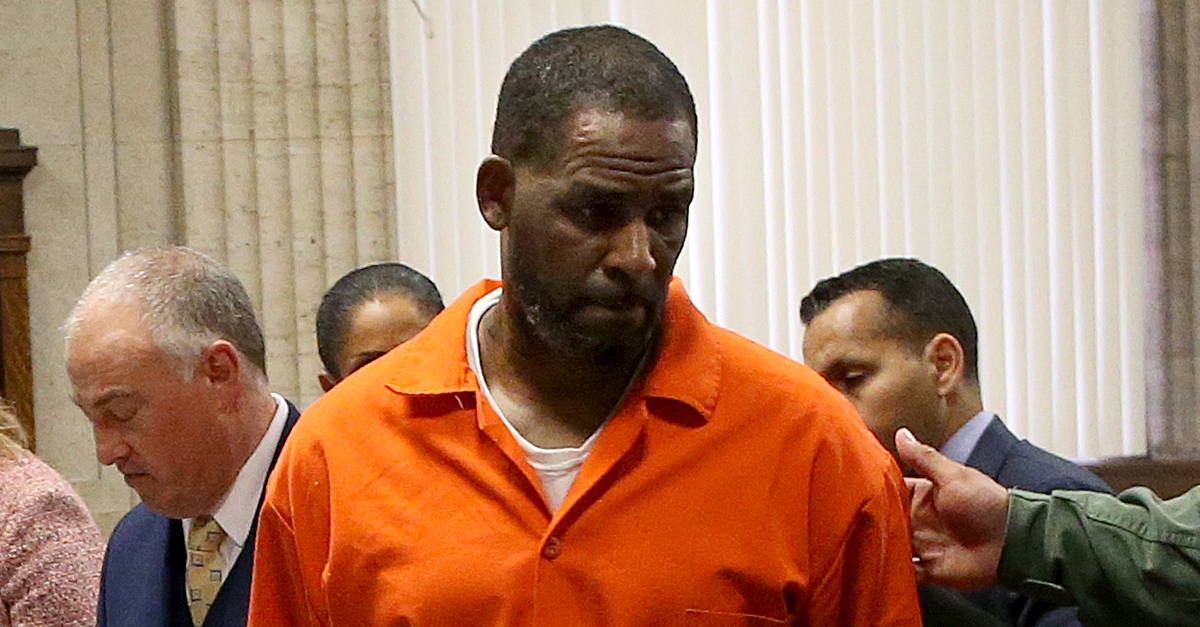
R. Kelly appears in an Illinois state courtroom in a 2019 file photo. He is involved with myriad criminal cases in multiple jurisdictions.
Disgraced R&B singer R. Kelly has been removed from suicide watch, federal prosecutors announced on Tuesday.
Marked by around-the-clock monitoring, suicide watch removes from incarcerated people all clothes or objects that can be repurposed for self-harm. Those assigned to that status commonly must wear so-called suicide prevention smocks, made out of exceptionally tough material that cannot be easily fashioned into a noose.
Kelly said he’s been on suicide watch status ever since receiving a 30-year sentence on Wednesday, following his sex trafficking and racketeering convictions.
His defense attorney Jennifer Bonjean argued in a lawsuit that the status was unnecessary because Kelly was not suicidal.
“Mr. Kelly impressed upon me repeatedly that he was not suicidal and the conditions of suicide watch at the MDC were extraordinarily stressful and harmful,” Bonjean wrote in an affidavit. “He expressed on multiple occasions that he did not want to be put on suicide watch and that he was not suicidal and had no thoughts of harming himself or anyone else.”
The lawsuit claimed that Brooklyn’s Metropolitan Detention Center has a practice of needlessly putting high-profile inmates, like convicted sex trafficker Ghislaine Maxwell, on suicide watch. Maxwell complained about that placement shortly before she received a 20-year sentence for her role in Jeffrey Epstein’s serial sexual abuse of young girls.
Assistant U.S. Attorney Melanie Speight informed the court that Kelly’s stint on suicide watch ended Tuesday.
“Today, on July 5, 2022, the Bureau of Prisons has informed the undersigned that plaintiff has been removed from suicide watch,” the prosecutor wrote in a two-page letter, arguing that Kelly’s motion for a temporary restraining order and preliminary injunction “should be denied as moot.”
Asserting that “MDC Brooklyn is run like a gulag,” Kelly’s legal team demanded compensatory damages over alleged violations of the Eighth Amendment’s prohibitions on cruel and unusual punishment. His attorney acknowledged that suicide watch “may be appropriate” for those at risk at self-harm, but she insisted that this category did not include Kelly.
The government believes that ending suicide watch should settle a key goal of his lawsuit.
“The lack of jurisdiction on plaintiff’s motion here is self-evident: because plaintiff has already been removed from suicide watch, there is nothing more that the Court can do for him with respect to his demand to be removed from suicide watch,” the government’s letter states. “When a plaintiff’s claim seeks to compel a federal official to act, and the official has already performed that act, the claim is moot.”
Kelly’s three-decade long sentence does not end his legal jeopardy. The 55-year-old pop star faces another trial on child pornography and obstruction charges in the Northern District of Illinois on Aug. 1.
The government cites Kelly’s pending transfer before that trial as another reason the court should not meddle in his conditions of confinement.
“Indeed, upon information and belief, Plaintiff will soon be transferred out of MDC to stand trial in the Northern District of Illinois,” the letter states. “To the extent Plaintiff is ever placed back onto suicide watch, such a placement would be separate and apart from plaintiff’s instant motion.”
Bonjean said that the government’s about-face on suicide watch “as soon as we were headed to court” is just “more evidence of their malice.”
“Our lawsuit will nonetheless continue,” she told Law&Crime in an email.
Read the government’s letter below:
(R. Kelly via Antonio Perez – Pool via Getty Images)